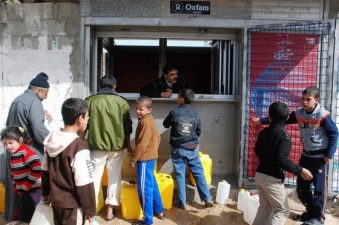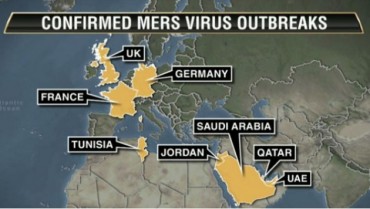
Skyscrapers (even rotating!) and dreams of vertical farms, but not a greenhouse to be seen. The Gulf is growing more and more dependent on imported food.
Many Gulf countries are investing heavily in foreign farmlands that are more fertile, chiefly in Africa, but also India and Pakistan, in a bid to secure a steady food supply. Looking out over the glass and concrete skyscrapers that dominate the skylines in Abu Dhabi, Jeddah or any other oil dependant city in the Gulf, farmlands or greenhouses are nowhere to be seen.
Ever since oil and natural gas was found in the 1950s and 60s, the region has undergone tremendous economic development, turning small villages into sprawling modern metropolises. Food production, on the other hand, has not been able to keep up pace to feed the masses of expats who have moved to the region to work in the bustling economy.
For the Gulf Cooperation Council member countries Kuwait, Bahrain, Qatar, Oman, Saudi Arabia and the United Arab Emirates, 90 percent of all food has to be imported at a cost of $6.7 billion according to a new report by the World Bank.
Located in an arid zone, up until recently the Gulf relied heavily on underground water reserves for desalination. The water accumulated when the region had a wetter climate but now is not being replenished by seasonal rainfall, as agriculture has to compete with the ever-rising demands of a growing population.
“We eat out of season, which is not good at all, and eat the same thing too much rather than different things at different times to suit the seasons. But then we live in air conditioned homes and that means we don’t notice the seasons here very much,” Nils El Accad, CEO of Organic Foods & Café, a supermarket chain in the United Arab Emirates, told The Media Line.
He said that people are becoming more aware of the origin of their food. But, still, he is skeptical about the possibility of organic farming in the Gulf.
“Technically you could grow it in the shuttle I think, as long as it is soil-based,” El Accad said. “The question is if it makes sense. If there is enough water, yes, for sure it would make sense, but using desalinated water leaves a very high carbon footprint.”
During the 1970s Saudi Arabia embarked on a project to make the country a self-sufficient wheat grower. By 1991 this was not only achieved but the kingdom became an exporter of wheat. This effort, however, led to fresh ground water reserves being quickly depleted and in 2008 the government decided that by 2016 it would end its grain production.
Qatar recently struck a deal with the Kenyan government to lease 40,000 hectares of land in the Tana River Delta to grow food to be exported back to Qatar. According to a recent report from the International Food Policy Research Institute a total of 8.66 million hectares of agricultural land can be found in Africa.
Abdolreza Abbassian, senior grain expert with the United Nations Food and Agriculture Organization, said in the future the Gulf would be even more dependent on grain imports as water becomes scarcer: “All the Gulf countries are net importers of grain,” Abbassian said, “being an area that is not suitable for growing it.”
“This is not new. It’s predicted this most likely will increase as they suffer from water scarcity,” he told The Media Line.
“The United Arab Emirates has gone further than most other countries as it is an exporter of wheat flower, importing wheat, adding value and then exporting the flower,” Abbassian said. “The amount it imports is not for domestic consumption.”
Abbassian did not foresee a risk that the food riots of 2008 would return: “First of all, the price is not half of what it was in 2008. The second point is that it was scarcity that triggered it and also a price hike on rice and there was already quite a tension in the region,” he said.
“There might be some riots somewhere in the region but not on the same levels as 2008,” Abbassian said, adding, “There is no sense of scarcity [in light of] the Russian ban [on wheat exports] as the demand can be met by other exporters.”
Reprinted from The Middle East News Source – The Media Line




You are right but it seems like the Gulf region is hardly growing anything.
Look, having to import food is not so bad if growing food is at the expense of having enough drinking water. Israel should be aware of this and import cotton and water intensive fruit such as mangoes and bananas.
Whatever happened to the plans for this rotating skyscraper? Scrapped with the dying real estate market in the region?